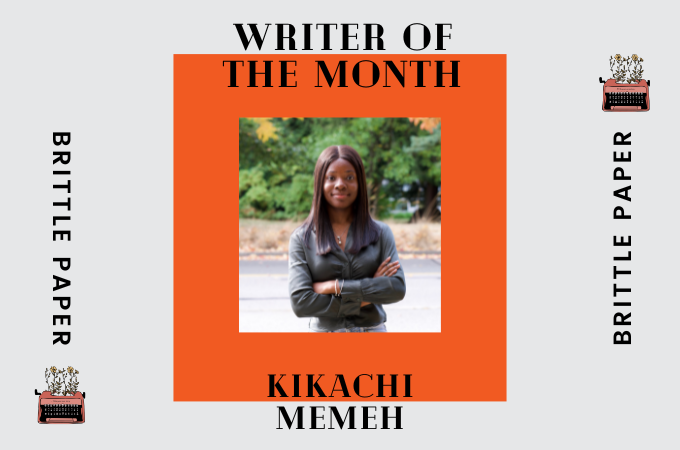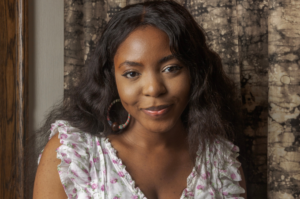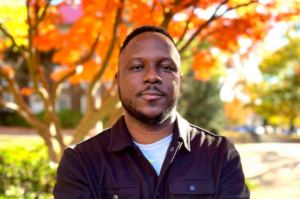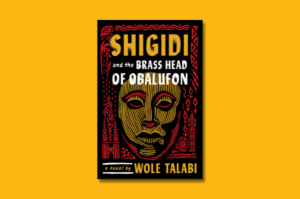
Brittle Paper’s Writer of the Month for June is Kikachi Memeh!
Born and raised in Nigeria, Kikachi Memeh is a journalist, writer and filmmaker. Having attained her bachelor’s degree in Mass Communication from Covenant University, Nigeria, she is currently undertaking a Master’s degree in Journalism at the University of British Columbia in Vancouver, Canada. As a journalist, Kikachi’s work revolves around Black and African arts and culture, and now also looks into socio-political news analysis from a critical race perspective.
As a writer, her essays – personal and journalistic – explore African diasporic relationships and similar themes. You’ve read her recent creative non-fiction piece, “Every Day Is a Market Day” but her work has also been published by and can be found in African Studies Review, AMAKA Studios, Vancouver Magazine, Culture Custodian, and elsewhere.
After her fantastic piece last month, we had to kickstart June with an interview with the wonderful Kikachi Memeh.
Brittle Paper
Kikachi, congratulations on being June Writer of the Month! Your piece “Every Day Is a Market Day” is such a beautiful and wholesome piece. I was so excited to finally publish it because I wanted to share it with so many people close to me, and every single person adored it.
Before we jump into discussing the piece, we need some background information on the Kikachi Memeh. I know you are a bit of an allrounder when it comes to the creative field but how does writing fit into all of this?
Kikachi Memeh
First off, thank you! I’m extremely honoured to be Brittle Paper’s Writer of the Month. I’m also delighted by all the feedback I’m getting on the piece, It’s great to finally have it out there and to know people connect with it personally.
When I think back at it, writing was actually one of my earliest interests. However, it began with an interest for scriptwriting. I would read some of my favourite novels and start visualizing them as films. At some point, my curiosity led me to figure out how to actually turn these stories into films. Once I learned that the first step of any film was a script, that was perfect. I started trying to figure out how to write one. I was like 12/13 at the time and I started downloading Screenwriting for Dummies, browsing through scripts, studying what they were supposed to look like and would adapt books like Dork Diaries into script formats.
Over the years, the interests morphed and diversified into many other things. I had my photography phase, which morphed into cinematography and then into directing and editing and then somehow into producing. It wasn’t until 2020 that I stumbled upon some of those old screenplay attempts, and I was so impressed with myself. I never knew I had made such audacious attempts. Before 2020, I was more focused on directing and producing films and radio projects that I had sort of abandoned writing. When I realized I wouldn’t be able to practically explore those interests because of lockdown, I decided to look back into writing and perfect that skill. I started with scriptwriting and began to diversify my writing skillset by learning how to write feature articles.
Brittle Paper
You have definitely kept busy over the years and, just wow! You have nurtured so many creative outlets and it’s beautiful how each one led to the next. I also think there will be some people reading this, picking up on the novel-to-screenplay technique to help them nurture their own creativity.
Usually, this is where I interrogate my writer about their writers, but since you admitted to all of these other creative loves, I am going to open the questions up a bit. But we will still start with: What is your favourite book of all time? I’ll let you pick a top three if you really cannot narrow it down.
Kikachi Memeh
This is a tough question. Any question about favorites are tough for me because I enjoy things very differently and try not to compare the things I consume. I try to enjoy them for what they are. Off the top of my head though, I’ll say Of Women and Frogs (re-titled The Teller of Secrets) by Bisi Adjapon, because it’s one book that has really stuck with me. The author took me through an entire lifetime in barely 500 pages and in each page, I could always see a bit of myself in the protagonist.
Nnedi Okorafor’s Akata Witch is also high up there for me because it opened my eyes to a genre of Nigerian literature I didn’t know could exist. As someone who only knew of juju based on hearsay, the book put to words and worlds all the mythical stories of juju I’d heard. I’ll also say all of Chimamanda Adichie books because I believe they have amazing re-read value which I think is very difficult to achieve in a book.
Brittle Paper
As a Nollywood aficionado, what do you believe to be the best Nollywood film? And what is the worst film you’ve watched?
Kikachi Memeh
Biyi Bandele’s Half of a Yellow Sun is very high up there – very high, top 2, and not number 2. I can’t say whether it’s underrated but it’s such a beautiful piece of Nollywood that I believe can stand the test of time. I really respect Nollywood filmmakers and their craft so I can’t discredit someone’s work by calling it the worst. This doesn’t mean there aren’t really terrible films out there, I just won’t name names.
Brittle Paper
If you could have dinner with any writer, photographer, actor or director from the continent, who would it be? Or let’s call it a dinner party and invite one of each.
Kikachi Memeh
Oooh dinner party! I’ll be sure to invite Ugochukwu Emebiriodo (photographer), I’ll have to pass on Biyi Bandele’s invite to Abba Makama (Director), Kehinde Bankole will for sure get an invite, and CNA of course.
Brittle Paper
Digging into your creative archive a bit, which I must say is incredibly impressive, you have a short film called Who’re You which you wrote, produced, directed, and edited. You really are an all-rounder! I’d love to hear more about this film.
Kikachi Memeh
A one-woman production team! [laughs] Who’re You is a project very dear to me because it was my first public effort at directing. I wanted to tell a story that stayed with the audience long after. The idea of personal identity is one I think about very often and believe others dwell on quite often too. The question ‘Who are you?’ is so simple yet can lead one into an existential crisis, and I wanted to capture that mental dilemma that goes on when we try to figure that out.
Brittle Paper
Now Kikachi, your May piece, “Every Day Is a Market Day” makes a strong point about the need and difficulty in sometimes situating oneself in a new environment, especially when that environment is in the west. The beauty of your piece though is that it gives tips on how to ground oneself in a new place, it acknowledges the challenges around this, it provides humour to something which is often a daunting reality, but it does this all while being comforting.
This may seem like a silly question with an obvious answer but what prompted this piece?
Kikachi Memeh
I’m still in awe of what this piece is today because I watched it twist and turn into many things before finally settling into this final version. I originally wanted to write about the one African store in Victoria, in an island in British Columbia. About the cultural significance of this one ordinary building and what it does to connect the few thousand Africans that live on the island. For some reason, the story just couldn’t sit still as just that. I struggled with following through with that storyline and my personal experience with the subject just kept trying to insert itself in. My creative non-fiction professor, Carol Shaben – a fantastic writer and professor – put me through my fear of inserting my personal voice in this story.
2022 was such a critical point in my life and I’m finding new ways to pen the things I went through and felt. It’s like now that I’ve sort of made sense of that very tough transitionary period, I can put these feelings into words. This story is a fragment of those experiences.
Brittle Paper
You provide all these beautifully descriptive phrases, yet my favourite is the succinct and straightforward lines in the introduction. “Out of the fairly short list, three stand out as the most crucial. Get a sim card, find a church, and find an African store. It just seems to be the order of things.”
You state at the beginning that this is about Nigerians migrating to another country, and I hope I do not take away from the intention and spotlight with my next comment. While you create this Nigerian diasporic community on your page, you also make extremely relatable points for most, if not all, of the African diasporic and any poc leaving their home. The need to first close the distance between family and your new home by calling. The need to then find a church or a mosque or a prayer circle, just somewhere there is a familiar familial group. And finally, the store where you can find, albeit expensive, tastes of home to appease one’s appetite but also homesickness. This is a very long way of saying, I was obsessed with your submission the second I started reading it.
Kikachi Memeh
I was wary of making generalizations because I could only speak of my experience, and that of which I watched others around me go through. My time in the African store really allowed me to observe how a lot of new migrants explored their new terrain and it seemed like many had the same mental checklist of things necessary for assimilation, whether they were migrating from within Canada or from Africa. God put me in that position to deal with the change by also helping others who were going through the same thing.
Outside one’s home country, it’s easy to cling to anything that has a semblance of home. A song, a scent, certain foods, spices, everything. It’s so easy to search familiar places for these little details. I talked a bit about how Church fits into it all, seeing as how Church is a huge part of Nigerian culture and is usually one of the places many start. I really enjoy seeing how many other POCs relate to this checklist.
Brittle Paper
For me, there’s nothing like being outside of my cultural or national space to make me suddenly feel very staunch and patriotic about my culture and country. It’s something one often forgets is very imbedded in the fibre of our being and your piece not only shows this but also provides a means of placating those gnawing feelings of displacement or unease in a new environment.
We will get to read a new piece from you on Friday. Is it a similar theme to the previous story?
Kikachi Memeh
This new story also looks into Nigerian affairs. It particularly looks into the varying tones and languages Nigerians use when talking about Nigeria to other Nigerians and foreigners. It’s a fun hermit crab essay that puts Nigerian-Nigerian and Nigerian-foreigner dynamics on display.
Brittle Paper
I can’t wait to share this piece with our readers.
Before our goodbyes, is there anything we haven’t covered about yourself that you want to share with our readers?
Kikachi Memeh
I really underestimated the power of one’s personal voice. As a journalist, that’s the one thing we’re continually taught to steer away from. As for me, I believe the best way to get anyone to care about anything of news value is to make them see themselves in it. It’s not enough to report things as they happen but to insert yourself for the audience to understand how they could feel about it. Creative non-fiction/literary journalism really embraces the power of personal voice and I’m having a great time exploring that.
It’s difficult for me to write about things I don’t care about, and when I write about the things I care about, or connect deeply with, I feel compelled to let you know how and why this connection came about. I then leave it to the audience to also make a connection with the subject or not.
Brittle Paper
Thank you for a great story, a great interview, and a great upcoming piece on Friday!
For more of Kikachi’s work, be sure to check back in on Friday, and for more interviews with our writers, check out our last month’s with Gershwin Wanneburg here.









Aanuoluwapo Adesina June 06, 2023 05:23
Congratulations to Kikachi on being selected as Brittle Paper's Writer of the Month! I enjoyed this interview very much. As a Nigerian and a Nigerian living outside the continent, I appreciated Kikachi's attention to the power that a single African store might hold. Living in a city in the US with a large population of Africans/Nigerians, and consequently, African/Nigerian stores and restaurants, I realized how easy it was to overlook the power these establishments hold in serving as a life source to the bond we have with our home countries, cultures, and communities. Kikachi's CNF piece, "Every Day Is a Market Day," excellently presents the hunger experienced by migrants to establish a home away from home and a sense of stability in the ever-teetering landscape of their host nation. It gives its reader a deeper appreciation for the gift of a space where "you have a sense of belonging, knowing you don't feel out of place," especially when the feeling of isolation is often costlier than a thousand-naira-sachet of tomato paste.